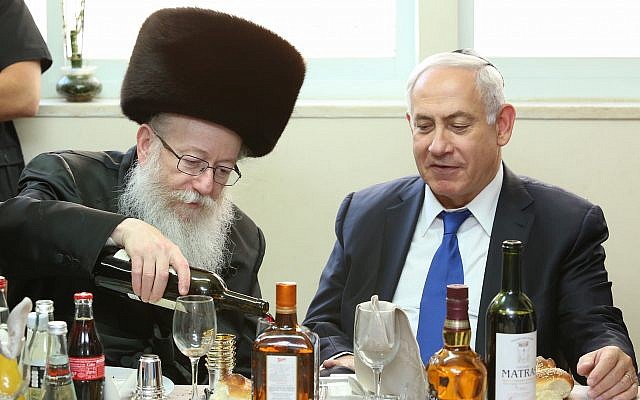A special report about the ongoing saga of the remarkable relationship between Prime Minister Binyamin Netanyahu and the Chareidi community was aired on Kan 11 on Monday. Ministers of Chareidi parties – both past and present, campaign advisors and political commentators analyzed the relationship between the Chareidi community and Netanyahu – the man and the legend – the good, the bad and the ugly.
Why does Netanyahu seem to have the implicit support of 97% of the Chareidi community? Is he “the secular admor of the Chareidim” as one political commentator termed it? Netanyahu lives a secular lifestyle but is deeply supportive of traditional Torah values, often quoting the Tanach to attest to the Jewish people’s claim to Eretz Yisrael. According to MK Rabbi Meir Porush (UTJ), his party supports Netanyahu in accordance with the Moetzet Gedolei Torah who says “to choose the candidate with the party closest to Jewish tradition.”
Historically, the Charedi parties sat in the opposition for many years, from 1952 until the revolution of ’77 (the 1977 election which swept Menachem Begin and the Likud into power – the first right-wing government since the founding of the state of Israel in 1948). Menachem Begin took the Charedi parties “out of exile” and brought them into his government. He viewed his relationship with the Chareidi parties as a long-term investment which would serve the Likud for many years despite the political price he was forced to pay, such as ceasing the operation of El Al on Shabbos.
The following years had its ups and downs for the Chareidim. The national-unity government of the ’80s weakened the political power of the Charedi parties. Israel’s left gradually became more and more estranged from traditional Torah values. In 1990, Rav Shach publicly bemoaned the state of the Labor party which “wished to seek a new Torah” and secular Jews who “don’t know what Yom Kippur is, what Shabbos is, what mikveh is.”
In the early 90s, Netanyahu rose to prominence. When Netanyahu was elected to his first term as prime minister in 1996, the Charedi parties were firmly behind him. The relationship between the Chareidim and Bibi has had its ups and downs, as did Bibi’s political career, but both have withstood the test of time.
According to Yaakov Weider, head of the Likud Chareidi division: “the left tries to educate the Chareidi community and wants to change them. Bibi respects the Chareidim and respects Judaism.” Another political commentator said that Bibi makes the Charedi parties feel “as they’re a wanted part of his government, his natural partners.”
Others hint that the Charedi ministers serve as a supportive force for Netanyahu minus the threat of political maneuvering. Although Netanyahu has to pay the price for Chareidi support by catering to their demands, he doesn’t have to fear that they will try to oust him from his position. As Interior Minister and Shas chairman Aryeh Deri said, “I don’t want to be the prime minister, the defense minister or the foreign minister. I’m satisfied with what I have. I want to assist the public. As far as I’m concerned, as long as the law is on his side and Hakadosh Baruch Hu grants him health, Bibi should continue to be the prime minister.”
(YWN Israel Desk – Jerusalem)












5 Responses
Netanyahu is a smart investor. Insependant on his personal beliefs, he looks back and sees the parties led by the advice of Gedolei Torah are consistent, dedicated and much more trustworthy then the leftists who put their personal ego way ahead of the interests of their citizens.
A smart diplomat looks backwards and forwards at the long term successes vs the short term failures.
May HaShem open his eyes to the Torah and may he take Daas Torah with him on his next term in office.
Who’s the bigger crook?
there is a strong bond between litzman and netanyahu; they are both under indictment and will have time together to finish a whole cycle of daf yomi.
Never trust a politician.
Bibi and the heads of the Chareidi parties, and their rabbonim are equally power-driven and they find a symbiotic relationship in holding on to that power regardless of the political and moral contortions that they must engage in to find “common ground” (defined as staying out of jail and keeping the NIS flowing).